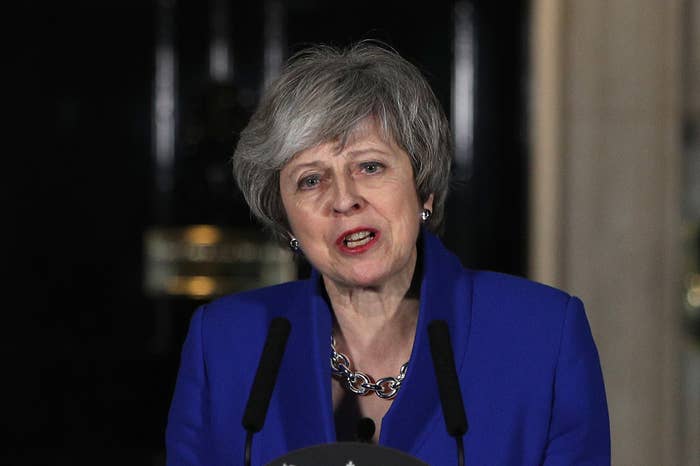
With less than 60 days to go before Britain leaves the European Union, MPs voted on Tuesday night for a solution to Westminster’s political gridlock that Brussels has already repeatedly rejected.
Theresa May said there was now a "clear route" to an exit agreement after the House of Commons voted by 16 to endorse her deal – which was defeated earlier this month by a historic margin – as long as the controversial Northern Ireland “backstop” is removed.
But while some in Westminster hailed the vote as a rare moment of political consensus, in reality the vote only added to the uncertainty, since the solution that MPs finally agreed upon is seen as a non-starter in Brussels.
Even as MPs were debating the amendment in the Commons, European leaders publicly ruled out reopening discussions about the backstop, the insurance mechanism which ensures that the Irish border is kept open even if the UK and EU can’t agree to a trade deal in future.
Within minutes of the vote passing, a spokesperson for European Council president Donald Tusk said: “The backstop is part of the Withdrawal Agreement, and the Withdrawal Agreement is not open for re-negotiation.”
Leo Varadkar, the Irish Taoiseach, also issued a statement saying the EU’s position was unchanged and that it’s not prepared to reopen talks.
The EU has repeatedly said that the backstop is an essential component of any withdrawal agreement and refused to budge despite previous attempts by May to reopen the talks. The UK’s prime minister has come under intense pressure from Eurosceptic Tory MPs who believe the backstop will bind the UK too closely to the EU after it leaves the union.
In the key vote on Tuesday night, MPs voted by 317 to 301 in favour of an amendment tabled by Graham Brady, a senior Conservative backbencher, signalling that parliament would endorse a withdrawal agreement if the unpopular backstop is replaced with “alternative arrangements”.
Speaking after the votes, the prime minister told the House of Commons: “It is now clear there is a route that can secure a substantial and sustainable majority for a deal”, adding that she would “take this mandate forwards” to the EU and attempt to begin fresh talks over the backstop.
But if Tuesday’s victory was a welcome relief for May after the first vote on the withdrawal agreement was lost by 230 votes, any hopes of the UK being able to reopen the negotiations appear doomed.
Tusk’s spokesperson also confirmed that if “the UK's stance on the future partnership were to evolve, the EU would be prepared to reconsider its offer and adjust the content and the level of ambition of the political declaration, whilst respecting its established principles.”
They added that should the UK ask to extend article 50, the EU27 would stand ready to consider the request taking into account the reasons for and duration of a possible extension. Any decision would need the backing of all 27 leaders.
A senior EU official told BuzzFeed News: "The irony of all this debate in the Commons is that “it makes crystal clear why we need a backstop in the first place”.
Diplomats dismissed suggestions that May could try to appeal directly to EU leaders on the back of the vote in parliament. A senior official from a major European government said: “They will hit the wall."
Yet as the EU immediately dashed hopes of renegotiating the backstop, prominent Brexiteers sought to claim victory. Describing the events as “good news”, Boris Johnson said he hoped European leaders would listen to the calls for change to the backstop, claiming: “It is no skin off their nose to do it."
Responding to May in the Commons, Labour Party leader Jeremy Corbyn said he would now agree to meet the PM “to find a sensible Brexit solution that works for the whole country” – a shift from his previous position of refusing to hold talks with May unless she rules out leaving the EU without a deal.
An attempt by Remain-supporting MPs to seize control of the process, and force the government to seek an extension to Article 50 if it doesn’t get a Brexit deal by the end of February, was defeated by 321 votes to 298.
Some observers had believed that amendment – tabled by the Labour MP Yvette Cooper – had a chance of passing, and would have had enormous consequences, effectively taking control of the Brexit process away from the government. The 23-vote winning margin was more comfortable for the government than many expected.
Cooper's amendment passed with the help of 14 Labour rebels who defied their own party whips to vote with the government.
Not everything went May’s way on the night. An amendment aimed at stopping a no-deal Brexit, put down by former Tory environment secretary Caroline Spelman and the Labour MP Jack Dromey, passed by just eight votes. Unlike the Cooper amendment, however, it is not legally binding. After the vote, May stressed it was “not enough” to take no-deal off the table.
An amendment tabled by Labour’s Rachel Reeves which sought to extend the transition period for two years was defeated by 32 votes.
Earlier, an amendment put forward by Corbyn which would’ve bound the UK to a customs union with the EU was defeated by 31 votes. Amendments put down by the Tory MP Dominic Grieve and the Scottish National Party were also defeated.



